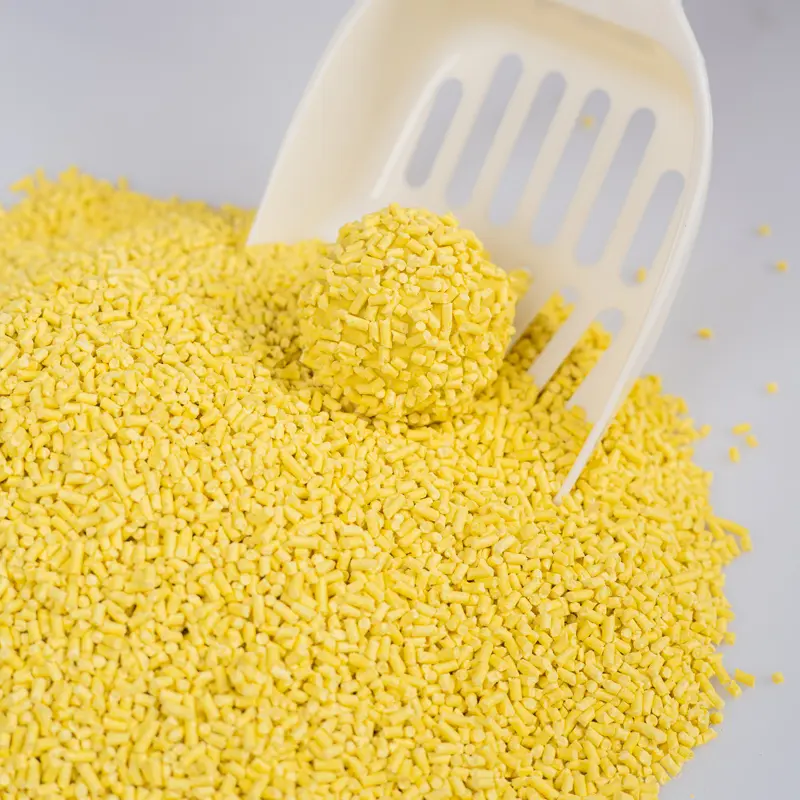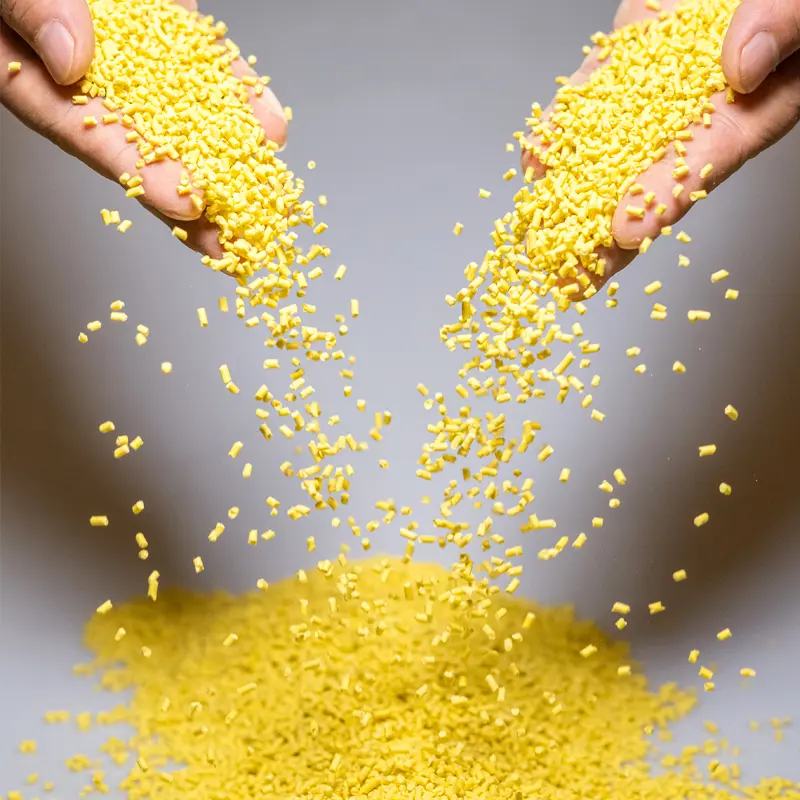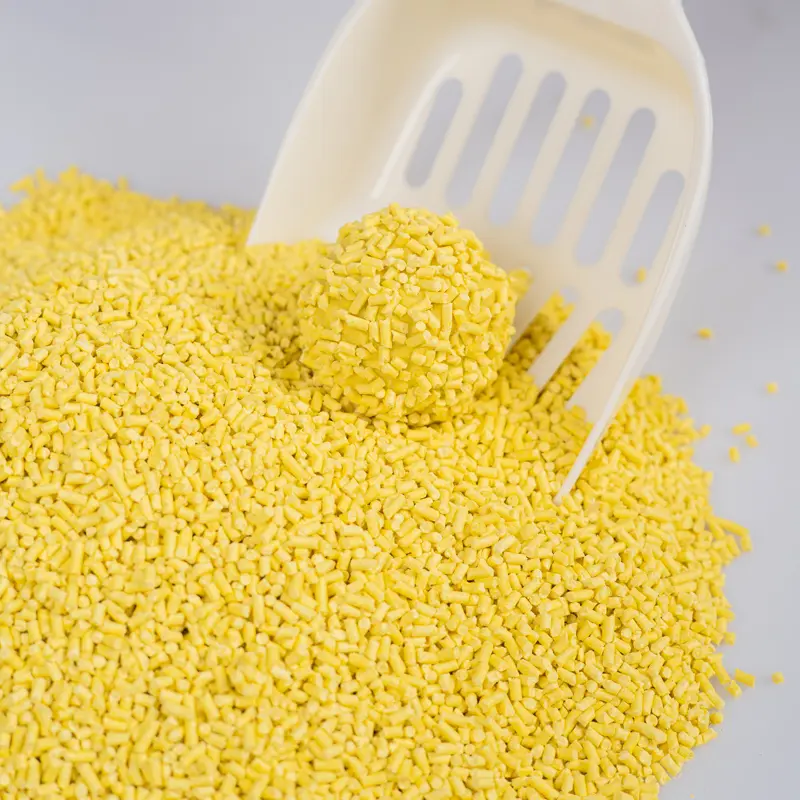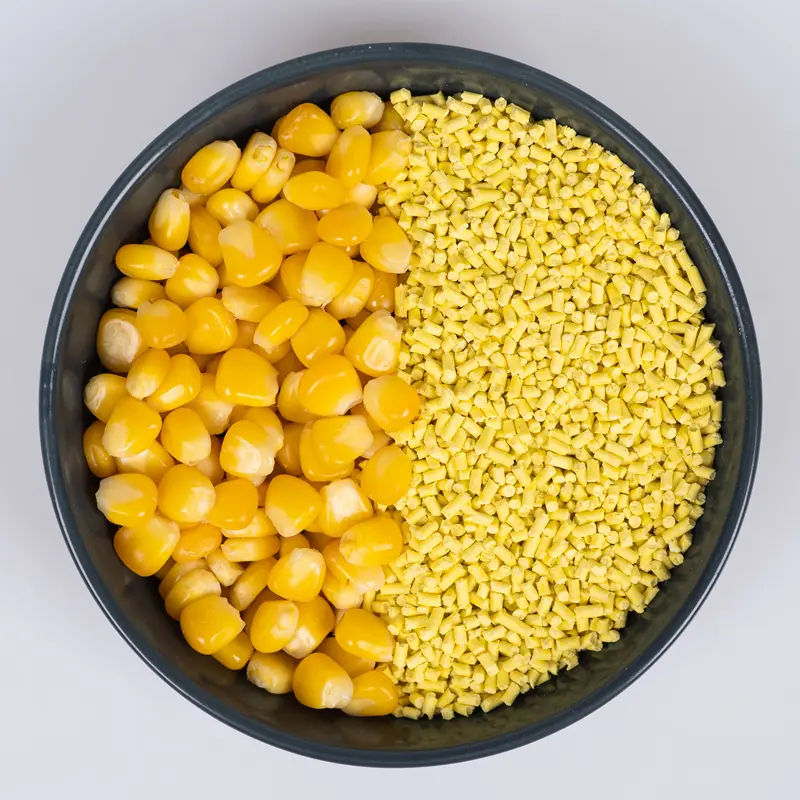As pet owners become increasingly conscious of environmental impact, the demand for sustainable and biodegradable cat litters has witnessed a surge. Among these eco-friendly choices, biodegradable corn-based cat litter has emerged as a popular option in the United States.
What is corn cat litter?
Corn cat litter is a type of cat litter made from corn-based materials. The primary ingredient is often corn kernels or corn by-products. The process of making corn cat litter typically involves grinding or processing the corn into granules or pellets that serve as the litter material. These granules are designed to provide a comfortable and absorbent surface for cats to use as a bathroom.It is becoming popular in US market.
Here are some key characteristics of corn cat litter:
Biodegradable:
Corn cat litter is considered environmentally friendly because it is biodegradable. This means that it can break down naturally over time, reducing its environmental impact.Compared with silica and bentonite cat litter,there is no extra work to dispose it. You even can buried it in your garden as fertilizer.
Clumping:
Corn cat litters are clumping, meaning they form solid clumps when they come into contact with moisture. This makes it easier to scoop out soiled litter and keep the litter box clean.But regularly check the litter level and add more litter as needed to keep it at the recommended depth. Corn cat litter is designed to clump, so it's important to maintain a sufficient amount.
Odor Control:
Corn cat litter is known for its effective odor control properties. The natural materials used in its production can help absorb and neutralize unpleasant odors associated with cat waste.
Flushable:
Corn cat litters are advertised as flushable, allowing for convenient disposal by flushing it down the toilet. However, it's important to follow the specific instructions provided by the manufacturer and to check if your local wastewater system can accommodate flushable cat litter.
Sustainable:
Corn cat litter is often promoted as a sustainable option because it is made from a renewable resource—corn.This product meet with the people's enviromental concept in US.
It's important to note that individual brands of corn cat litter may vary in terms of specific formulations, features, and performance. As with any cat litter, it's advisable to follow the manufacturer's recommendations for use and disposal. Additionally, some cats may have preferences for certain types of litter, so it may take some trial and error to find the one that works best for your cat and household.

"This picture showed corn cat litter is a clumping cat litter, it can clump when it comes into contact with mositure"
I am a brand owner,can we start my businees with corn cat litter?
Starting a business with corn cat litter is indeed a possibility, and it can be a promising venture, especially if you're interested in environmentally friendly and sustainable products for pets. Here are some steps you can consider if you're thinking about starting a business with corn cat litter in US:
Market Research:
Investigate the demand for eco-friendly and natural cat litters in your target market.If you are a brand from US, you can invest the corn cat litter in your market, and find if they have a good sale and if this product are welcomed by your local customers.Identify your competitors and understand their strengths and weaknesses.Analyze consumer preferences and trends in the pet care industry.
Business Plan:
Develop a detailed business plan outlining your business goals, target market, marketing strategy, distribution channels, and financial projections.Consider factors such as packaging, branding, and pricing.For these plant-based cat litter, you also need to spend time and money to promote it in US market and let more people know its strength and value.
Supplier and Manufacturing Partnerships:
Establish relationships with reliable suppliers of corn-based materials or manufacturers who specialize in producing corn cat litter.
Ensure a consistent and high-quality supply of materials for your product.Gelin Town pet is a professional plant-based cat litter factory, they are producing middle high-end product for their customer and have a full range of products for your selection.
Product Development:
Work on creating a cat litter product that stands out in terms of quality, performance, and eco-friendliness.Consider factors such as clumping ability, odor control, and ease of use.Acutally there are many factories who can produce corn cat litter in China, but the quality vary greatly.You have to pick up one who's product have have a good performance.
Regulatory Compliance:
Understand and comply with any regulations or standards related to pet products and cat litter in your target market.Ensure that your product meets safety and environmental standards.Along with peoples concept is becoming in US,the plant-based cat litter will be become the main product in pet industry.
Branding and Marketing:
Develop a strong brand identity for your corn cat litter.Implement effective marketing strategies to promote your product, including online and offline channels.Highlight the eco-friendly aspects of your product in your marketing efforts.
Distribution Channels:
Decide on the distribution channels for your product, whether it's through pet stores, online platforms, or other retail outlets.Explore partnerships with distributors or retailers to expand your product's reach.
Customer Feedback and Improvement:
Gather feedback from customers and use it to improve your product and customer experience.Stay responsive to market trends and continuously innovate.So it is important for you to pick up a factory who are good at innovating a new product and upgrade their product according to your requirement.
Sustainability Initiatives:
Consider incorporating additional sustainability initiatives into your business, such as using eco-friendly packaging or supporting environmental causes.Usually these packaging are more expensive, you need to consier if it is necessay for you to use an environmental packaging.
Starting a business with corn cat litter can be a rewarding endeavor, especially if you're able to offer a product that meets the needs and preferences of environmentally conscious pet owners. Conduct thorough research, plan carefully, and be prepared to adapt as your business grows.

"From this picture, you can see that corn cat litter is a dust free cat litter, it will be healthy for your cat's inspiratory system"
How to find a direct factory for corn cat litter from China?
Finding a direct factory for corn cat litter in China involves a series of steps to identify and connect with reliable cat litter manufacturers. Here's a guide to help you through the process:
Online Research:
Start by conducting online research to identify potential manufacturers. Use search engines and business-to-business (B2B) platforms to find companies that specialize in pet products, particularly cat litter.A professional factory will specilize in producing one type of cat litter. If a factory said they can sell different kinds of cat litter, you need to consider if they are a trading company.
Verification and Due Diligence:
Verify the legitimacy and credibility of potential manufacturers. Look for companies with a solid reputation, positive customer reviews, and a history of exporting products.If they have an experience to work with a famous brand in your local, it will be helpful for you to learn about the factory.
Contact Manufacturers:
Reach out to potential manufacturers directly. Use the contact information provided on their websites or B2B platforms.Prepare a list of questions regarding product specifications, production capacity, lead times, pricing, and any other relevant details.
Communication:
Communicate with manufacturers to assess their responsiveness, communication skills, and willingness to collaborate. Ask for samples if possible to evaluate the quality of their products.
Factory Visits:
If feasible, consider visiting the factories of shortlisted manufacturers to inspect their facilities, production processes, and quality control measures. This step can provide valuable insights into their capabilities and working conditions.
Request Certifications:
Ask for relevant certifications, such as quality control certifications, environmental certifications, or any other standards applicable to pet products.
Negotiation and Agreements:
Negotiate terms, including pricing, payment terms, minimum order quantities (MOQ), and shipping arrangements.Clearly outline specifications and expectations in a formal agreement or contract.
Quality Control:
Implement a robust quality control process. Specify your quality requirements and standards, and discuss how the manufacturer will ensure consistency.
Always exercise caution and due diligence when dealing with international suppliers. It's advisable to work with reputable manufacturers and consider seeking legal advice when finalizing contracts. Additionally, building a strong and transparent relationship with your chosen manufacturer is key to a successful and sustainable business partnership.










